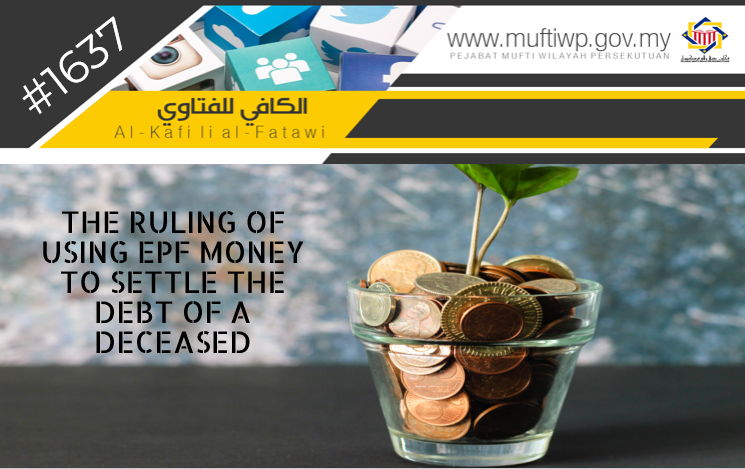Question:
Assalamualaikum Datuk Mufti. My husband has just passed away. We have two cars where one of it is fully paid and the other car is still being paid through a loan.
In your opinion, is it permissible for me to settle the loan of my late husband using his EPF money that I’m going to get with the presumption that the car will be mine? Hope for an explanation.
Answer:
Waalaikumussalam wrt. wbt.
Alhamdulillah, praise and thanks to Allah for the countless blessings He has blessed us all with. Blessings and salutations to the Prophet Muhammad PBUH, his wives, his family, companions and all those that follow his teachings to the day of judgement.
The situation is closely related to the issue of faraid (inheritance) for it involves the property left by a deceased. The faraid property or inheritance is as set by Baitulmal MAIWP which means all property that is of value and owned by the deceased while he was alive and continues until his death. The property includes:
- All property obtained through permissible trade, hibah (gift), division of inheritance, endowment, donation and others.
- Rent that hasn’t been paid by the deceased.
- The debt of the deceased that hasn’t been settled.
- Dividend or premium obtained from the property of the deceased.
- The Employees Provident Fund (EPF)
- Any outcome from the efforts made by the deceased such as fishes caught in a trawl set by the deceased.
According to the above listed properties, both cars owned by the deceased are categorized as the inheritance that should be divided to the rightful heirs of the deceased.
Then, if the deceased still has debts that need to be settled, the debts should be settled using the property left by the deceased before the rest of the inheritance is divided among the heirs.
The inheritance is to be used for the expenses of the management of the deceased, debts, will and last but not least to be divided to the heirs.
(See Minhaj al-Thalibin, pg. 180)
According to the above situation, it should first be explained that the EPF money that the deceased’s wife will receive is not the hers, for in truth it is still owned by the deceased. The EPF money will be disbursed to the wife because the wife is the nominee. A nominee means a person who will act as the administrator that will manage the division of the EPF money according to the Islamic law. Thus, a nominee is not the owner of the money, but the accurate term is the inheritance manager.
(Refer GUIDELINE IN FILLING EPF FORM)
Furthermore, the debt of the deceased should be settled first. Considering the EPF money is still the property of the deceased, then it is not an issue for the heirs especially the nominee to use the money to settle the debt of the deceased including car loan.
However, if there is a person who volunteer to settle all the costs for the deceased funeral management, debts, then it is not an issue and this is even considered as a good deed and commendable charity in Islam, especially if the person is from among his own family members. A hadith narrated by Sulaiman bin ‘Amir al-Dhabiy states:
الصَّدقةُ على المسكينِ صدقةٌ وعلى القريبِ صدقتان صدقةٌ وصِلةٌ
"Giving charity to a poor person is charity, and (giving) to a relative is two things, charity and upholding the ties of kinship."
Sunan al-Tirmizi (658)
However, if the wife of the deceased thinks that the car will be hers after she settles the car loan of her husband using the EPF money, then in our opinion, this understanding is inaccurate and should be rectified. The reason is the EPF money received by the wife is not hers. Thus, if the deceased still has his parents and children, then they have their rights and portion on the deceased’s inheritance, including the two cars the deceased left, where it is not limited to only the wife of the deceased unless if it has been gifted to the wife and the name on the car grant has been changed to the name of the wife while the deceased was still alive.
Regarding the family members who has a right in the inheritance, please refer to our previous article, AL-KAFI #1580: IS IT PERMISSIBLE FOR STEPCHILD TO RECEIVE THE INHERITANCE?
As an illustration for the division of fairad to the heirs, if the deceased has a wife, son and both his parents, then their portions are as the following:
Current price of the car: RM 24,000
Mother: 1/6 (RM 4,000)
Father: 1/6 (RM 4,000)
Wife: 1/8 (3,000)
Son: The remaining inheritance (RM 13,000)
According to the above explanation, it can be concluded that the car is not solely owned by the wife even if she offered to settle the loan of the deceased consequently, the car should be divided according to the faraid divisions as stated in the above example.
The wife can only have full ownership if all the heirs withdraw from their rights whether by giving it to her for free or asking for a payment compensation.
Wallahua’lam.
Endnotes:
[1] Website: https://www.maiwp.gov.my/i/index.php/en/2015-11-20-07-49-26/faraid-pusaka


